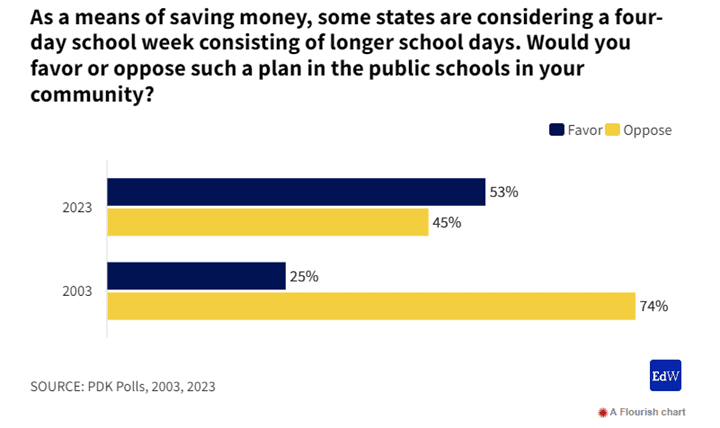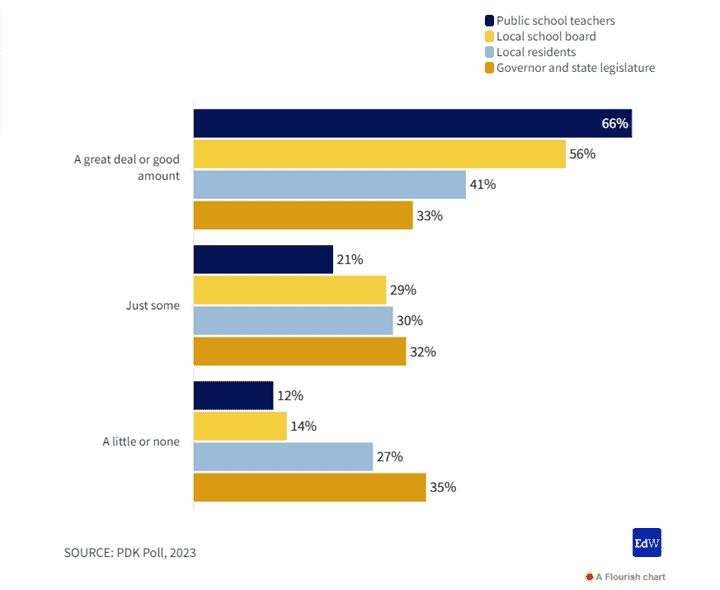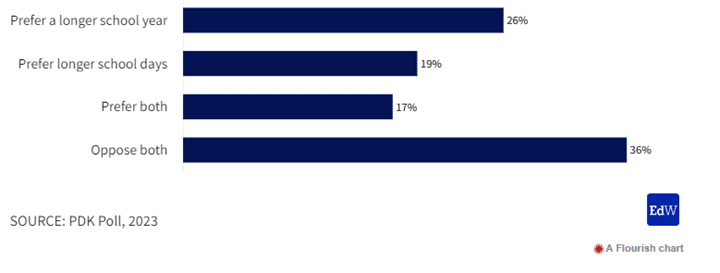4-Day School Weeks Surge in Popularity Among American Adults
Survey finds widespread support for teacher pay, mixed feelings on curriculum control
Education Week | By Arianna Prothero | August 24, 2023
That’s nearly twice the number who said so two decades ago, according to the annual PDK International poll, and support for the idea holds mostly steady even among adults living with a child younger than 18—half of whom said they support the idea in combination with longer school days and as an effort to save money.
The poll, which draws from a nationally representative sample of U.S. adults who were surveyed in June, has been conducted annually for 55 years and serves as an important barometer of public opinion toward public education.
This year’s findings illustrate the public’s growing acceptance of alternative school schedules as well as support and empathy toward teachers, said James Lane, the chief executive officer of PDK International.
“A theme that I see is that a number of Americans see the teacher shortage as a serious issue or crisis, and they believe that teachers are undervalued and overworked and underpaid. And they believe that increasing pay is a solution,” he said.
Strong majorities of respondents say that teachers are undervalued, should be paid more, and have more influence over what is taught in public schools—although the level of support varies based on political affiliation.
Overall, 73 percent of Americans say teachers are undervalued, 67 percent support increasing their pay even if it means raising property taxes, and 66 percent say that teachers should have more say over what is taught in schools—a substantially larger share than the percentage of poll respondents who said the same for school boards, local residents, and state policymakers.


That doesn’t mean that Americans don’t see a role for lawmakers in setting boundaries on curriculum, said Lane. Fifty-one percent of respondents supported state laws regarding what teachers can teach.
Those findings stand somewhat in contrast to some current political storylines about waning support for public education: Most Americans do seem to support teachers. But they also believe in some checks on what’s taught.
The survey did not ask specifically about the recent wave of state laws outlawing the discussion of certain topics around race and LGBTQ+ issues.
“We’re not in any way saying that just because one group has more influence that respondents are saying that other groups should have no influence,” Lane said. “But what [respondents] are saying, I think, is largely that support for teachers is important now. It’s important to lift up the profession.”
How much influence do you think each of the following groups should have in deciding what’s taught in public schools in your community?

Support for increasing teacher pay has risen drastically over the decades, Lane said.
“We’ve gone from a place in 40 years where fewer than half did not believe that teachers’ salaries were too low, to now two-thirds of Americans believing that teachers’ salaries are too low,” he said. And “a majority support raising teacher salaries even if it means raising taxes.”
In terms of support for four-day school weeks as a means to save money, younger Americans in particular favor the idea, said Lane.
Among adults under 30, 63 percent favor a four-day school week. Among adults 65 and older, support dropped off substantially, landing at 41 percent. The idea was also more popular among adults without a college degree, 57 percent of whom said they were in favor, than adults with a college degree, 45 percent of whom said they supported the idea.
Only a sliver of schools nationally have moved to four-day school weeks, largely in rural areas in a handful of states.
Some states and public school districts are considering expanding the school day or the school year as a way to try to improve student learning outcomes. Which of the following would you prefer for the public schools in your community?

Research has found that four-day schedules did not impact students’ academic achievement in the schools studied so long as they maintained a high or medium amount of instructional time for students. Meanwhile, the cost-saving benefits for districts were limited.
As a strategy to help students learn more, 62 percent of adults say they are on board with longer school days, longer school years, or a combination of the two. But many districts found implementing extended time as a post-pandemic learning strategy hard to pull off.






